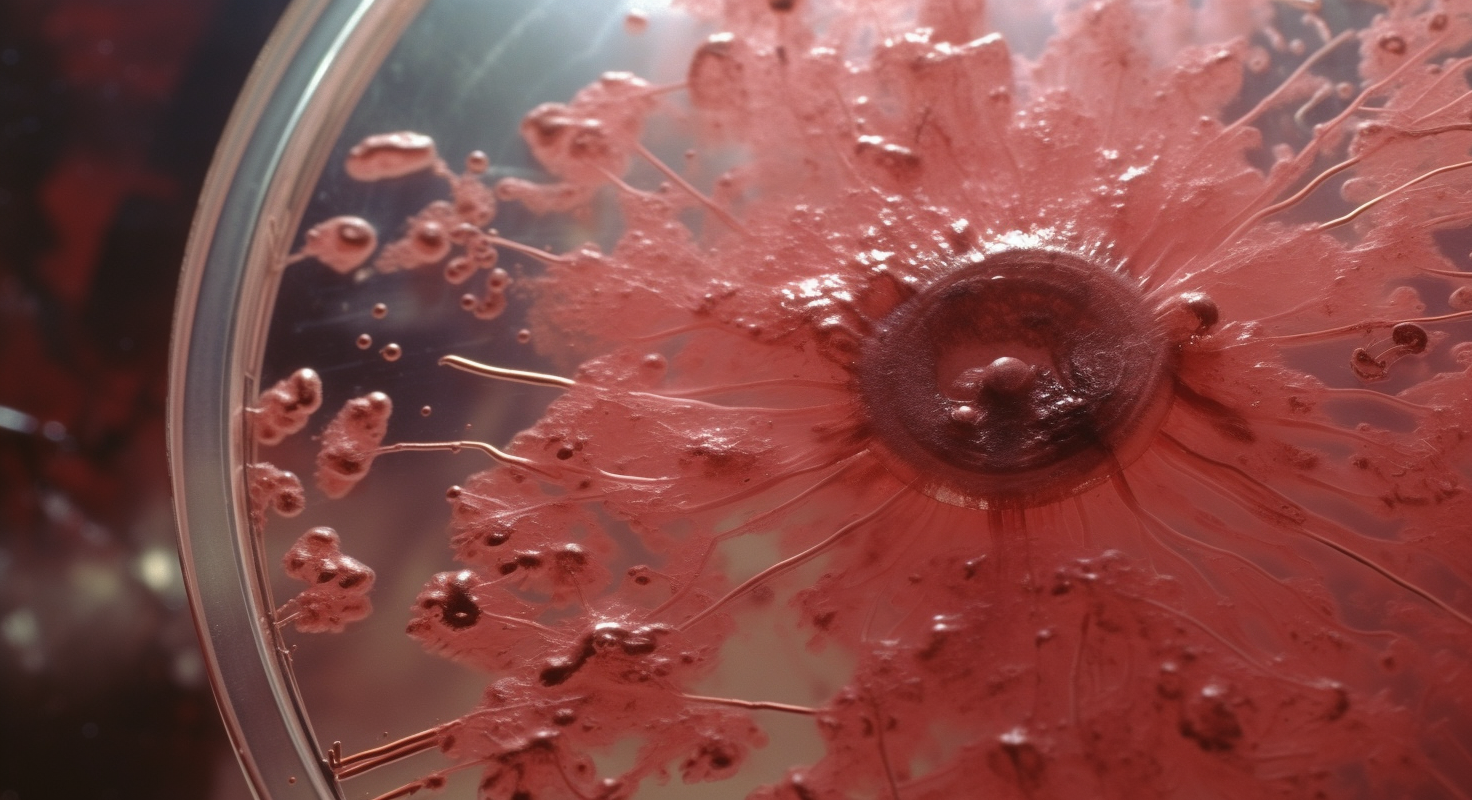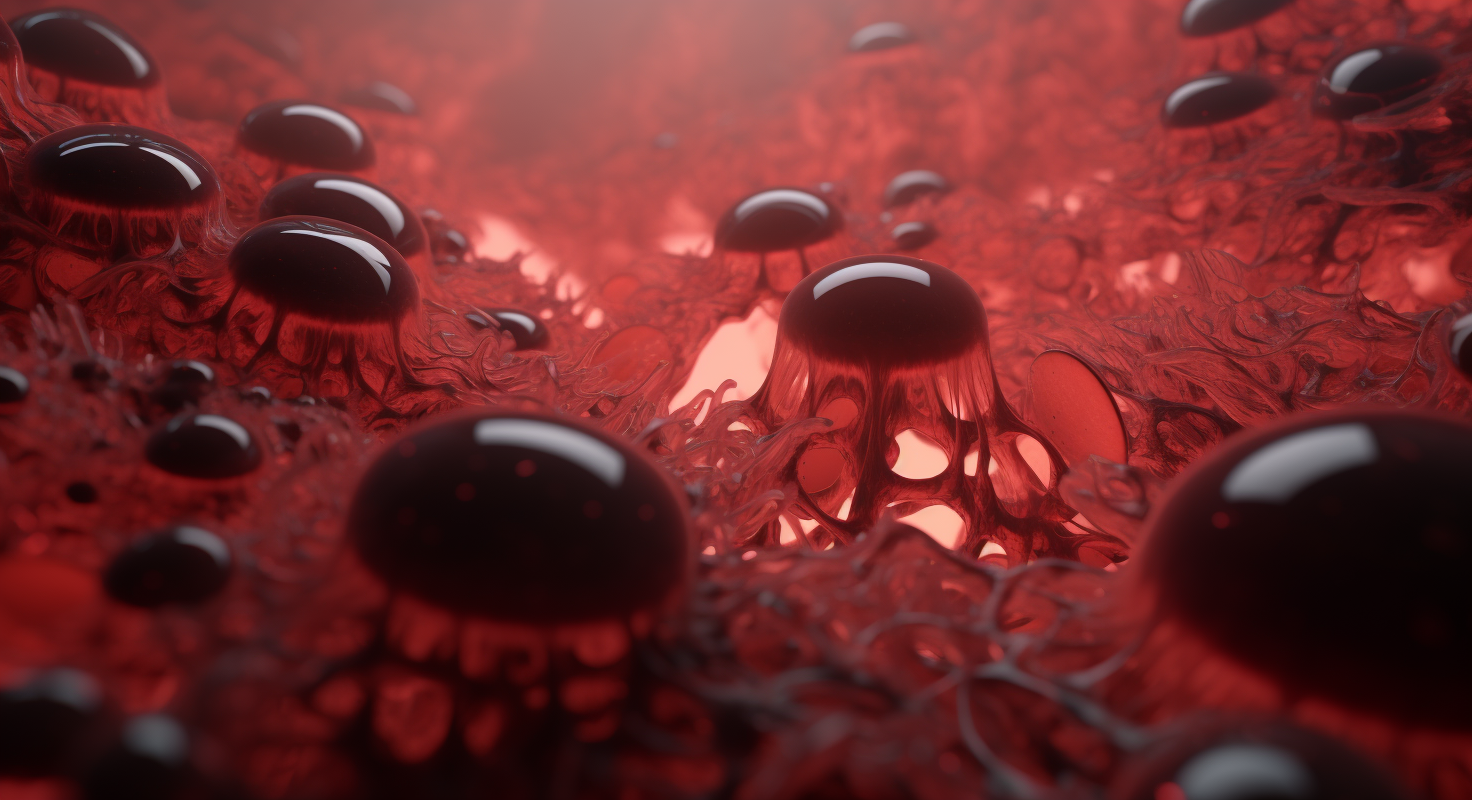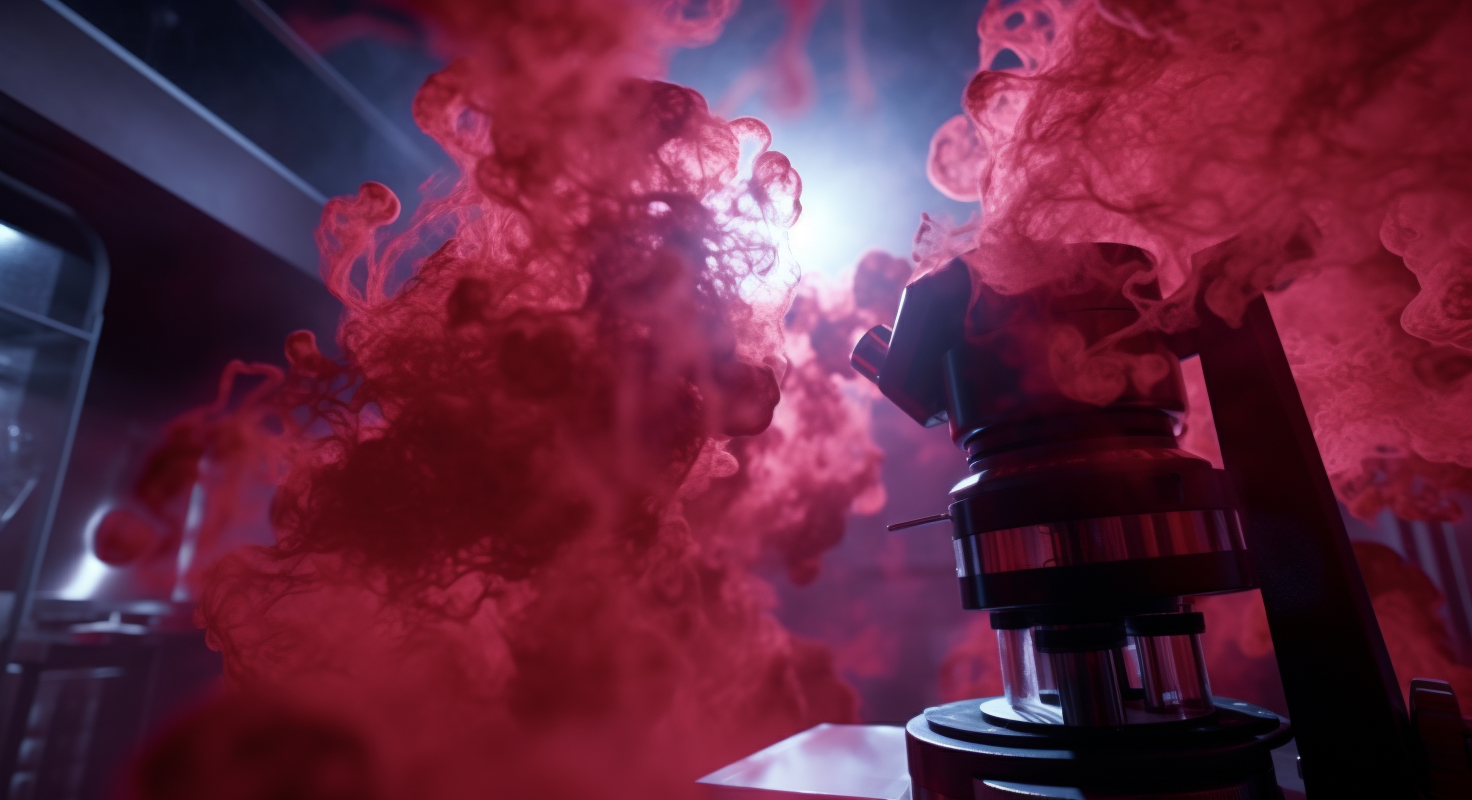Revival
On Mars, more than a billion years ago...
Throughout the incalculable breadth of eons, the planet Mars bore silent witness to the most miraculous spectacle of evolution. Once a pulsating, thriving world, it now stood shrouded in the endless, cold emptiness of space, a silent ball of red, shrouded in mystery and cloaked in a sense of melancholy that hung in its thin atmosphere like a pall. As the ages passed, the once vibrant atmosphere was eroded, molecule by molecule, slowly sucked away into the unfathomable void of the cosmos. As the air thinned and the heavens retreated, the abundant Martian life had no choice but to adapt or perish. The survival of these Martian species was characterized by a remarkable transformation - the development of protective bubbles of polymers, creating a buffer against the ever-thinning atmosphere.
These resilient polymer-encased lifeforms thrived, defying the raw inhospitality of their environment, creating a singular existence on the verge of extinction. They turned the encroaching void into a haven, their polymer shields a fortress against the desiccating Martian atmosphere. But even the most secure fortresses are vulnerable to the whims of time. As the ages rolled on, a series of violent solar storms lashed the red planet, piercing its protective magnetic field and assaulting its fragile biosphere. The relentless onslaught caused the cells within the polymer shields to mutate, at first becoming a new species living in symbiosis with their host, akin to the symbiosis of cyanobacteria and fungi in lichen. Through continued evolution, for some of the symbiotic life forms, these polymer shield organisms became parasitic, consuming their hosts, giving birth to a new, independent species.
These novel entities, akin to the skin cells of Earth organisms, adapted to the harsh conditions, using the polymers that had once nurtured and protected their progenitors as a source of nourishment. They floated through the thin Martian atmosphere, borne aloft by the weak but ever-present winds, slowly consuming the carcasses of the former dominant fauna. As they feasted, they multiplied, shedding countless crimson spores that were caught by the Martian winds. These tiny, parasitic life forms thrived, asserting their dominance over the red planet. But their triumph was short-lived. As the polymer-shelled life forms dwindled, so did their food source, leading to a decline in their numbers.
Their reign gave way to a time of dormancy, their life cycle interrupted, forcing them into a state of stasis. Like sleeping giants, they waited, hibernating amidst the dust and rocks of the Mars we know today. Their existence, barely discernible, seemed to be a relic of a bygone era, a testament to the unyielding cycle of life, evolution, and adaptation. Through countless eons, they waited in the shadowed crevices and beneath the rust-colored soil, their single-celled forms etched into the annals of Martian history, waiting for the chance to rise again.
Ahom peered through the porthole of Ben Gonder's Martian habitat module, his eyes scanning the barren, reddish landscape that extended beyond. "It's hard to believe, Ben," he said, his voice filled with a mixture of awe and trepidation. "The surface has such complex dunes, it's as if it were made alive by the tenuous winds."
Ben Gonder nodded, his eyes fixated on a microscope's eyepiece. "It's extraordinary," he agreed, "but what's even more fascinating is what lies beneath this barren surface."
Ahom turned to look at Ben, curiosity etched across his face. "You're referring to other life forms?"
"Yes," Ben said, looking up from the microscope. He gestured for Ahom to take a peek. "It's still preliminary, but the samples we've collected so far suggest there could be dormant microbes in the Martian soil."
"Dormant? As in, they're not extinct but merely... sleeping?" Ahom asked, trying to wrap his head around the concept.
"Exactly," Ben replied, his eyes alight with excitement. "Imagine, microbes that have survived for possibly a billion years in an incredibly harsh environment, waiting for conditions to improve."
"And what would it mean if we could somehow 'wake them up'?" Ahom questioned, leaning back against the module's metal wall.
Ben looked thoughtful. "Firstly, it would be a major breakthrough in astrobiology, proof of life beyond Earth. But moreover, studying these Martian microbes could give us a better understanding of life's durability, its adaptability. It may help us answer fundamental questions about the potential for life elsewhere in the universe, maybe even provide insights into the origins of life itself."
"Sounds like a monumental task, Ben," Ahom said, looking at his companion with newfound respect. Ben merely smiled, turning his attention back to the Martian samples. The promise of their microscopic secrets kept his focus as steadfast as ever.
Ahom peers out the window, and reflects.
As I stare at the Martian terrain through the reinforced glass, I can't help but feel a hum in my veins, a resonance from my code suit. This intricate interface, this cocoon of information and sensory interpretation, it syncs with my consciousness, guiding my understanding of the world around me.
Through my code suit, the once alien world of Mars feels like an extension of my own being. The suit, in its abstract wisdom, nudges my thoughts towards the dormant microbes that Ben is so engrossed in studying.
A flurry of calculations and probabilities begin to dance in my head, a side-effect of my code suit's analysis. How do we approach awakening life that's lain dormant for eons? The idea is akin to trying to stir a sleeping giant, not knowing whether it will wake gently or wreak havoc. Yet, it's a risk we must take, a mystery we must unravel.
My code suit nudges me, signaling an idea. Could we replicate an environment similar to ancient Mars, perhaps even simulate the conditions that once allowed these microbes to thrive? The suit overlays the barren Martian landscape with a lush, virtual holograph of its past. I see bodies of water, an atmosphere denser than it is now, a Mars teeming with life on a microbial level. My heart races at the sight - a virtual past playing out in my present, powered by an amalgamation of data and consciousness.
Could we perhaps create this environment in a controlled setting, coaxing the dormant life to awaken in familiar surroundings? The nudge from my code suit gives me the confidence that it is possible. The code suit, an interface of information, perception and consciousness, guides me to understand that the key may lie in Mars' past.
I realize that it's not just about waking the microbes, it's about learning and recreating the conditions that fostered their existence, to begin with. In that understanding, my consciousness resonates with the code suit, and I feel a surge of excitement. It's a complex puzzle, but it's one that I've begun to piece together.
"Ben," I begin, my voice resonating in the austere quiet of the module, "I've been running some simulations with my code suit."
Ben doesn't break his attention away from the magnified image of the Martian soil on his screen. "Go on, Ahom," he encourages, eyes still glued to the microscope.
"We may have the solution right here," Ahom admits, leaning against the workstation, his gaze falling on the stack of empty polymer petri dishes. "Instead of replicating the environmental conditions of ancient Mars in a broad sense, what if these microbes need a more specific catalyst?"
Ben finally looks at Ahom, eyebrows raised in intrigue. "And what would that be?"
"Think about it, Ben. These microbes survived for possibly a billion years. It's unlikely they were continuously active during that whole period. Maybe they adapted to enter a state of dormancy, triggered by certain environmental conditions."
"That makes sense," he says, leaning back in his chair, "So, what's the catalyst for bringing them back?"
"Well," Ahom pauses, picking up one of the petri dishes, "These microbes were likely dormant when Mars started to lose its atmosphere, right? It's likely they've never been exposed to a high concentration of water. What if the catalyst is something more subtle?"
Ahom looks at the petri dish in his hand, "We could try creating a more gentle environment - using these polymer petri dishes and a fine mist of moisture. The dishes themselves could simulate the polymer encapsulations on which they've survived, and the mist... it's a softer, more ambient touch of water. A drop of dew on Mars, so to speak."
Ben nods, thoughtfully running a hand through his hair. "A subtle awakening. That's an interesting thought, Ahom. I like it. Let's try it."
In the pristine confines of the Martian module, Ben Gonder and Ahom set about their task with a quiet sense of anticipation. A single polymer petri dish, its surface shimmering under the stark light with the thinnest veil of dew, lay in readiness. Carefully, Ben transferred a minuscule sample of Martian soil into the dish, the tiny grains of red dust holding a world of dormant life, unseen to the naked eye.
As Ben worked, his every breath fogged the inside of his protective face shield, a living testament to the moisture and warmth that was so alien to the frigid Martian landscape outside. Hours crawled by in a taut string of tension and hope, until suddenly, their patient vigil was rewarded. A minute but distinct crimson discolouration began to appear on the petri dish, a sign of corrosion caused by the reawakening microbes.
Within moments, a vaporous crimson puff of spores erupted from the corroded petri dish, a silent, almost poetic explosion of life. As they made contact with the moist inside of Ben's face shield, another corrosive reaction occurred, fogging his view in one swift, unexpected assault. Holding his breath, Ben staggered, the edges of his vision darkening as he fought against the shock of the sudden onslaught.
Swift as thought, before Ben could take a single breath, Ahom moved to assist, his code suit proving to be a barrier against the corrosive crimson spores. Ahom ripped Ben's face shield off, casting into the far corner near the petri dishes, then lifted Ben, who had still not come to his senses and taken a breath. As if gone with the wind, Ahom moved them both into the larger glass-domed greenhouse, the larger volume of air and lack of polymers diluting any effect of the few crimson spores that may have followed in their wake.
Still in shock, Ben took his first breath since the onslaught, curiously looking at Ahom. All the while, the awakened Martian lifeforms exhausted their polymer feast of dew-moist petri dishes and face shield in the habitat module, emitting one last puff of crimson spores before slipping back into dormancy. The quiet hum, of the habitat module air filtering and circulation system now at increased throughput, was the only remaining testament to the drama that had just unfolded within its walls.



Bạn đang đọc truyện trên: AzTruyen.Top